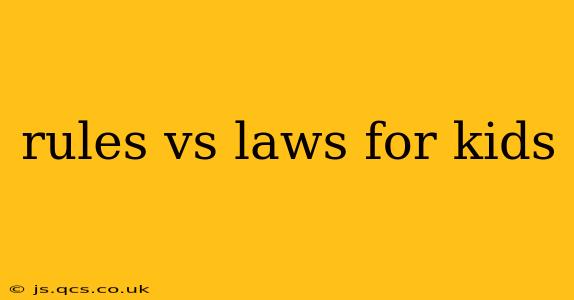Learning about rules and laws is a crucial part of growing up and becoming a responsible member of society. While both set guidelines for behavior, there are key differences between rules and laws that kids should understand. This post will help clarify these distinctions, answering common questions kids and parents might have.
What are Rules?
Rules are guidelines created by individuals or groups to maintain order and ensure safety within a specific context. Think of them as the smaller, everyday guidelines we follow. They're often created to make things run smoothly and fairly.
Examples of rules:
- Family rules: No hitting, cleaning your room, being kind to siblings, saying "please" and "thank you". These rules are set by your parents or guardians to create a harmonious home environment.
- School rules: No running in the hallways, raising your hand before speaking, following instructions from teachers. These rules are designed to ensure a safe and productive learning environment.
- Game rules: Following the specific instructions of a board game or sport ensures fair play and enjoyable competition.
- Club rules: Rules within a sports club or hobby group ensure the safety and participation of everyone.
What are Laws?
Laws are rules created and enforced by the government to maintain order and safety within society as a whole. They apply to everyone within a particular area (like a city, state, or country) and breaking them can result in consequences, such as fines or even jail time.
Examples of Laws:
- Traffic laws: Stop at red lights, wear seatbelts, drive at the speed limit. These laws ensure safety on the roads.
- Criminal laws: Stealing, lying under oath, damaging property. These laws protect people and their belongings.
- Environmental laws: Protecting natural resources and preventing pollution. These laws help protect our planet.
What Happens if You Break a Rule?
The consequences of breaking a rule vary depending on where the rule applies.
- Family rules: Consequences might be losing privileges (like screen time), extra chores, or a time-out.
- School rules: Consequences might include detention, suspension, or loss of participation in school activities.
- Game rules: Consequences might be losing a turn, forfeiting the game, or being disqualified.
What Happens if You Break a Law?
Breaking a law can have serious consequences, depending on the severity of the offense. This might include:
- Fines: Paying money as a penalty.
- Community service: Working to benefit the community as a punishment.
- Jail time: Serving time in prison.
Are Rules and Laws Always the Same?
No, rules and laws are different. Rules are usually less serious and apply to smaller groups or specific situations. Laws are serious, apply to everyone within a jurisdiction, and are enforced by the government. Laws are based on the values and principles a society agrees on, aiming to create a safe and fair community for everyone.
Why are Rules and Laws Important?
Rules and laws are essential for a well-functioning society. They help:
- Keep us safe: Traffic laws, for instance, protect us from accidents.
- Promote fairness: Rules and laws ensure everyone is treated equally.
- Prevent chaos: Without rules and laws, society would be disorganized and potentially dangerous.
- Protect our rights: Many laws protect our fundamental rights and freedoms.
Can Rules Change?
Yes, both rules and laws can change. Family rules can be adjusted as children grow older. School rules may be updated to meet evolving needs. Laws are also subject to change through the legislative process – often reflecting changes in societal values or new challenges.
This explanation provides a simple but comprehensive overview of rules versus laws for kids. Remember, understanding and respecting both rules and laws are vital for becoming a responsible and contributing member of society.
